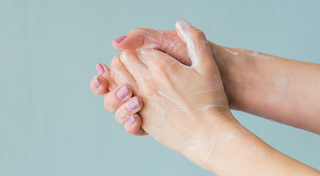Is hand sanitiser effective against COVID-19?
The best way to prevent the spread of infections and decrease the risk of getting sick is by washing your hands with plain soap and water, Washing hands often with soap and water for at least 20 seconds is essential, especially after going to the bathroom; before eating; and after coughing, sneezing, or blowing one’s nose. If soap and water are not available, the WHO recommends consumers use an alcohol-based hand sanitiser that contains at least 60% alcohol.
Should I be using antibacterial soap to wash my hands?
There is currently no evidence that consumer antiseptic wash products (also known as antibacterial soaps) are any more effective at preventing illness than washing with plain soap and water. In fact, some data suggests that antibacterial ingredients could do more harm than good in the long-term and more research is needed.
Where can I buy hand sanitiser? If I can’t find it in the store, can I make my own?
Many retail stores and pharmacies sell hand sanitisers, Huxter has over 800 stockists in Australia and New Zealand where you can find our product. It is available in tubes for handbags, bottles for home use and refill pouches on our website huxter.com.au
Government guidelines recommend that consumers do not make their own hand sanitiser. If made incorrectly, hand sanitiser can be ineffective, and there have been reports of skin burns from homemade hand sanitiser. The agency lacks verifiable information on the methods being used to prepare hand sanitiser at home and whether they are safe for use on human skin.
If I add alcohol to non-alcohol hand sanitiser, will this be better to prevent COVID-19?
No. Addition of alcohol to an existing non-alcohol hand sanitiser is unlikely to result in an effective product. FDA has also issued guidance for the temporary preparation of certain alcohol-based hand sanitiser products by firms during the COVID-19 public health emergency. These temporary policies do not extend to non-alcohol based products at this time.
Where should hand sanitiser be stored?
Hand sanitiser should be stored out of reach, and sight, of children. It should not be stored above 40 degrees Celsius (for example, it should not be stored in a car during the summer months).
Is hand sanitiser dangerous for children?
For children under six years of age, hand sanitiser should be used with adult supervision. When used according to the directions on the Drug Facts Label, hand sanitiser is not dangerous for children.
Hand sanitiser is dangerous when ingested by children. Drinking only a small amount of hand sanitiser can cause alcohol poisoning in children. However, there is no need to be concerned if your children eat with or lick their hands after using hand sanitiser. It is also important to keep the product out of the eyes.
What should you do if your child ingests hand sanitiser?
If your child ingests hand sanitiser, call the poison information line or a medical professional immediately. Poisons Information Line 24 hours a day from anywhere in Australia on 13 11 26.
What are denaturants and why are they added to hand sanitiser?
Denaturants are added to alcohol to make it less appealing to ingest. Denatured alcohol is used in hand sanitiser to deter children from unintentional ingestion – the denatured alcohol makes the hand sanitiser taste bad so children will not want to continue once they have had a taste. There are a number of adverse events every year resulting from intentional or unintentional ingestion of hand sanitiser, which is a particular concern for young children. Huxters Sanitiser contains denatured alcohol.
How effective are aerosol / atomised delivery containers such as a perfume style spray?
FDA does not recommend spraying humans with aerosolized disinfectant. There is currently no data to demonstrate that this method is effective in treating or reducing the spread of COVID-19. Research suggests that more than 50% of the active alcohol is evaporated before coming in contact with skin rendering the efficacy substantially reduced against germs.


